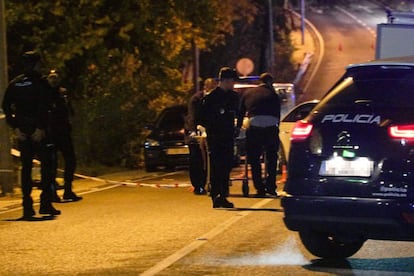The specialized police unit cracking down on hitmen on Spain’s Costa del Sol
Sixteen people have been arrested thanks to a group that focuses exclusively on score settling

It took more than a thousand calls to find out which taxi driver unknowingly gave a suspect a ride. Another job involved poring over 100,000 documents. Since the beginning of 2019, the National Police’s Organized Crime and Drug Unit (Udyco) in the southern city of Málaga has had a unit that is exclusively focused on score settling in the Costa del Sol. The results reflect the group’s effectiveness: most of the crimes from 2019 have been solved.
“It’s very demanding, it’s a non-stop job,” says one of the specialized officers. So far, 16 people have been arrested, most for being either the alleged material or intellectual author of the murders.
If the operation goes badly and the drugs are seized by police, “someone has to pay for it”
The latest crime to be solved took place in January 2019. A businessman from Marbella’s nightclub scene was shot around 15 times when he arrived home early in the morning. Two individuals were waiting for him outside his garage. The case marked the beginning of a grim year for the Costa del Sol. At the end of February, police arrested two alleged hitmen and four of their cronies, all of whom were from the Netherlands and members of a dangerous gang. They worked for large criminal organizations and traveled to Spain to kill their target. Indeed, the group was arrested when they were about to commit another crime in Spain.
Six murders
The fall of last year was a particularly bloody time on the Costa del Sol, which saw six murders. One of them took place on November 15 in a residential development called Andasol in Marbella. Two unknown individuals shot two people. One of the victims, 66, died at the scene. The other, 55, survived but was severely injured. Minutes after the murders, several members of Udyco’s team arrived at the crime scene and began a “very complex investigation.” The evidence indicated that a rival drug gang had tried to steal either money or merchandise from another, a ploy known in Spanish as a vuelco. This conclusion was driven by two factors: the use of firearms and the criminal history of the victims.
Police were able to connect the murders with a well-known Spanish drug dealer. Five days later, the officers identified the alleged perpetrators, two Romanian individuals, who were arrested two days later in their country. Police later arrested the mastermind of the killing in Marbella, as well as the surviving victim of the shooting and his wife for suspected drug trafficking.
In addition to these 11 arrests, police also tracked down the criminal behind the point-blank shooting of a Bulgarian man in October last year. The body of the victim, who had been shot 14 times, was found in a ditch on the outskirts of Marbella. After his body was found, officers began an investigation that they describe as “methodical, ordered, detailed, constant and without a schedule.” They combed every millimeter of the area looking for clues.
One of the biggest challenges police face when investigating these types of cases is that “nobody talks”
The officers initially found nothing. But after searching a much greater distance, they discovered the first clue: a shell located one kilometer away from the victim’s body. Ten days later, officers identified the alleged killer, who was also from Bulgaria. Not long after, the man was found in Germany, where he was arrested with the help of the German police. When the suspect’s car was intercepted, officers found traces of the victim’s blood, even though the vehicle had been carefully cleaned. “International cooperation is also essential,” explain sources from Udyco.
One of the biggest challenges police face when investigating these types of cases is that “nobody talks.” Even the victim’s family say they don’t know why the person was killed. Often, families do not let officers into their homes and instead guard the door with their lawyers. “If there is some type of cooperation, it’s more likely done to throw us off,” the police officers say. Another problem is that the hitmen come from outside of Spain. “They kill and leave,” the officers explain. The hitmen cover their faces with masks and torch the car they traveled in.
The growing pressure from police and the constant drug seizures in Spain have put drug traffickers on edge as they suffer huge financial losses. Every mistake is costly, pushing criminals to look for new drug routes and impose personal guarantees. If the operation goes badly and the drug is seized by police “someone has to pay for it,” the officers explains. When the cost is a seven-figure sum, that someone may end up paying for it with their life.
English version by Melissa Kitson.
Tu suscripción se está usando en otro dispositivo
¿Quieres añadir otro usuario a tu suscripción?
Si continúas leyendo en este dispositivo, no se podrá leer en el otro.
FlechaTu suscripción se está usando en otro dispositivo y solo puedes acceder a EL PAÍS desde un dispositivo a la vez.
Si quieres compartir tu cuenta, cambia tu suscripción a la modalidad Premium, así podrás añadir otro usuario. Cada uno accederá con su propia cuenta de email, lo que os permitirá personalizar vuestra experiencia en EL PAÍS.
¿Tienes una suscripción de empresa? Accede aquí para contratar más cuentas.
En el caso de no saber quién está usando tu cuenta, te recomendamos cambiar tu contraseña aquí.
Si decides continuar compartiendo tu cuenta, este mensaje se mostrará en tu dispositivo y en el de la otra persona que está usando tu cuenta de forma indefinida, afectando a tu experiencia de lectura. Puedes consultar aquí los términos y condiciones de la suscripción digital.









































